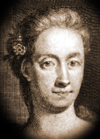


Please Contact Us if you have any questions or to report any problems.
PITHY QUOTE FROM Haywood: Selected Works
Public breakfasting is an invention which the projectors of time-killing methods have found out to rob husbands of their wives, children of their parents, and houses of their mistresses, nay Heaven too of its due at those very hours in which their presence is most required. . . .
The Selected Works of Eliza Haywood. The Wife, Sect. XI
The Selected Works of Eliza Haywood. Electronic Edition.
ISBN: 978-1-57085-645-7
Language: English
|
Detail: Eliza Haywood, engraving by G. Vertue after a portrait by James Parmentier; first published 12 August 1723 as a frontispiece to the "Fifth" edition of Ab.1.5a Love in Excess.
|
List of ContentsEliza Haywood (1693?-1756) was the most prolific female writer of the 18th century, author of more than 75 volumes of conduct and advice literature, criticism, journalism, fiction, drama, translations, literary history, fictionalized biography, pseudo-memoirs, and literary parody. Her enormous popularity in her own day is a matter of record: one scholar has demonstrated that her first novel "share(s) with Gulliver's Travels the distinction of being the most popular English fiction of the 18th century before Pamela (1741)." In our time, Haywood's interest in matters of gender and her lively, sometimes lurid, style have made her the subject of a rapidly expanding body of scholarship. According to the Modern Language Association's International Bibliography of Language and Literature, more publications about Haywood have appeared in the last decade than had appeared in the preceding 25 years; more than a dozen have appeared in the last few years alone. "Suddenly," the well-known critic Paula Backscheider writes in a 1998 essay, "Haywood is everywhere." Backscheider is right to assert that "we need to . . . engage (Haywood's) text as we have those of Aphra Behn, Daniel Defoe, and Samuel Richardson with the full arsenal of contemporary critical theory." But one wonders how we might go about doing so, given the paucity of primary material available to us. If Haywood's critical stock is soaring, her bibliographical status remains depressingly earth-bound. This series reprints non-fictional works by Haywood, with particular attention to the journalism, criticism and "conduct and advice" material. This material is among Haywood's richest, both in terms of coverage and in terms of prose style. Here, Haywood explicates and defends the ideas about, for example, gender and culture that she develops obliquely elsewhere; here she establishes herself as an incisive commentator on 18th-century culture as well as a writer of sensationalistic fiction. Haywood, Eliza. The Selected Works of Eliza Haywood. Edited by Alexander Pettit et al. 6 vols. London: Pickering & Chatto, 2000-2001.
NotesEditorial board:
|
Pettit and Blouch make the most far-reaching contribution to Haywood studies with their multi-volume set, of which only Part I was available for this review . . . . The critical apparatus of the edition is useful without being intrusive, assuming a specialist audience. The textual introductions are kept deliberately brief, headnotes deal primarily with bibliographical history and the place of the work in Haywood’s oeuvre, and the annotations make no attempt to be exhaustive, keeping the focus on the ‘rich compendia of data’ that are Haywood’s texts (I.xii). . . . Blouch’s biography makes a number of significant corrections to previous views of Haywood’s life, providing a more accurate biographical context for the works published in the edition and for current critical understanding of Haywood’s life and career. |
